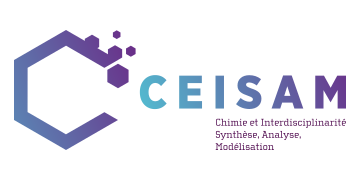
DHOLMEN - Development in Hemato-OncoLogy and precision nuclear MEdiciNe
DHOLMEN aims to structure a program of fundamental, translational and clinical research to advance precision medicine in hematology and nuclear oncology.
DHOLMEN will address interdisciplinary scientific issues around 3 major themes: 1- Artificial intelligence: prognostic biomarkers and risk assessment, 2- Theranostics: combined diagnosis and therapy in nuclear medicine, 3- Targeted Alpha-Therapy; and organizational and medico-economic issues, ensuring a holistic approach to healthcare innovation.
These issues will be developed in 6 scientific Work Packages, complemented by 3 structuring Work Packages (Education/Training, Technology Transfer, Site Structuring).
Project summary
Nicolas Galland and Arnaud Tessier are partners in WP1, and each co-leads a task in this WP. WP1 aims to develop new radiopharmaceuticals for imaging and therapy, which will be exploited in the other scientific WP. The main challenges will be to make available or optimize access to innovative radionuclides, identified as priorities, and to develop radiolabeling chemistry for high in vivo stability and theranostic approaches. Two CEISAM teams are particularly involved in this WP1: for ligand synthesis (SYMBIOSE) and molecular modeling (ModES). A first task will be to broaden access to alpha radiopharmaceuticals and reduce their toxicity in order to extend their use. A second, complementary task will be to develop pairs of radionuclides and/or radiopharmaceuticals to produce theranostic tools and thus move towards precision nuclear medicine.
Virginie Blot is a partner in WP6 and co-leader of a task in this WP. She is also co-leader of WP7, dedicated to training through and for research. In the context of a significant development of radionuclide-targeted therapy (in terms of number of procedures and variety of radionuclides used) and of Artificial Intelligence approaches in nuclear medicine procedures, WP6 aims to study the quantity and potential impact of radioactive substances released into the sewage system by patients undergoing radionuclide-targeted therapy, and to reduce the cost of training AI systems to ensure their viability. CEISAM's SYMBIOSE team is particularly involved in setting up procedures for recycling patient waste (mainly radio-contaminated urine) and using post-purified urinary radionuclides for preclinical purposes. Such recycling could be a safe, sustainable, inexpensive and ethical means of research and experimentation in the field of nuclear medicine innovation.
Project members
Françoise KRAEBER-BODERE
Centre de Recherche en Cancérologie et Immunologie Intégrée Nantes Angers Inserm
UMR 1307 CNRS
UMR 6075 Nuclear Medicine Department Nantes University Hospital
PU-PH University Professor - Hospital Practitioner
Associate professor
External partners
Accélérateur pour la Recherche en Radiochimie et Oncologie à Nantes Atlantique X (Arronax)
Laboratoire de physique SUBAtomique et TECHnologies associées (Subatech) UMR 6457
Laboratoire des Sciences du Numérique de Nantes (LS2N) UMR 6004
Laboratoire d’Economie et de Management Nantes-Atlantique (LEMNA) UMR 4273
Service de Médecine Nucléaire CHU Nantes
Service d’Hématologie CHU Nantes
Service d’Oncologie CHU Nantes
Service de Neurochirurgie CHU Nantes
Service de Gastroentérologie CHU Nantes
Service de Médecine Nucléaire ICO
